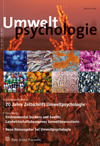Artikeldetails
 Peter Schmuck (2017),
Peter Schmuck (2017),Von der Umweltpsychologie zu einer Transformationspsychologie der Potentialentfaltung.
Umweltpsychologie 21(1), 106-118.
Dieser Artikel wurde in deutsch verfasst.
| Zusammenfassung: | Der Beitrag beschreibt ein neues Persönlichkeitsmodell, in dem Potentiale für nachhaltigkeitsorientiertes menschliches Handeln angelegt sind. Die Entfaltung dieser Potentiale, so die zentrale These des Modells, korreliert mit einer Bereicherung des individuellen Wohlbefindens. Aufbauend auf den Annahmen dieses Modells wird ein wissenschaftstheoretischer Ansatz abgeleitet, der Göttinger Ansatz der Nachhaltigkeitsforschung. Dieser Ansatz basiert auf neuen Prämissen der Rolle von Psychologen in der Nachhaltigkeitstransformation unserer Gesellschaft, etwa der Legitimierung eines aktiven Engagements von Psychologen für nachhaltige Lebensmuster. Für beide theoretischen Konstrukte werden empirische Daten zusammengetragen. Diese stützen zum einen den Zusammenhang zwischen Potentialentfaltung und Wohlbefinden und weisen zum anderen erfolgreiche praktische Nachhaltigkeitstransformationen im kommunalen Sektor wie die Entstehung von 139 Bioenergiedörfern in Deutschland (zwischen 2005 und 2017) aus. Aus den Befunden werden Folgerungen für Aktivitäten der Psychologie bei der Nachhaltigkeitstransformation, bei der dezentralen Energiewende in Deutschland und bezüglich der Bioenergie im künftigen Energiemix gezogen. Abschließend wird für eine Umbenennung der Fachdisziplin „Umweltpsychologie“ in „Transformationspsychologie“ plädiert. |
| Schlagworte: | Potentialentfaltung Transformationspsychologie Umweltpsychologie Umweltverhalten Wohlbefinden |
| Abstract: | This chapter describes a new personality model based on human potentials for acting in line with sustainability guidelines. The unfolding of these potentials correlates with an enrichment of individual well-being. A new approach of theory of science is derived from these assumptions: The Göttingen approach of sustainability science. This approach formulates new premises regarding the role of psychologists within the sustainability transformation of our society, for instance the legitimation of an active engagement of psychologists for sustainable life patterns. Both theoretical constructs are checked with empirical data. These data support on the one hand the correlation between unfolding of sustainability-relevant human potentials and well-being. On the other hand, the development of 139 bioenergy villages between 2005 and 2017 demonstrates the practical success of the Göttingen approach of sustainability science. Recommendations are derived from these data for future activities of psychologists within the sustainability transformation, the decentralized energy turnabout in Germany and regarding the role of bioenergy in the future energy scenario. Finally, the autor pleads for a renaming of the psychological subdiscipline „environmental psychology“. Instead, the alternative naming „psychology of transformation“ is proposed. |
| Keywords: | Being Environmental Behavior Environmental Psychology Psychology Of Transformation Unfolding Of Potentials Well |
Zum Inhaltsverzeichnis

